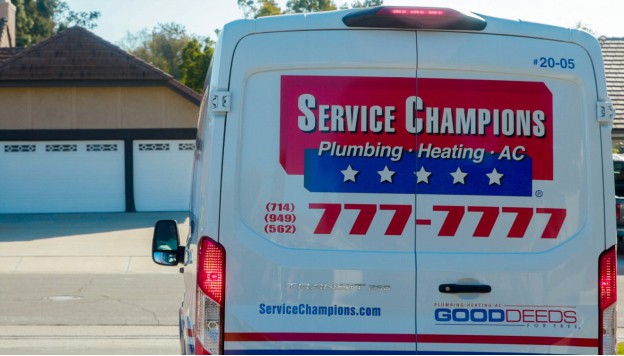7 Factors to Consider Before Purchasing an Air Conditioner
Air conditioners have evolved from being a luxury to a necessity, providing comfort and a respite from the sweltering heat. Though you may need an air conditioner, choosing the right one is more than picking from a lineup. There’s a lot to consider.
If you’re looking for a new air conditioner, here are 7 factors to consider before purchasing an air conditioner from the pros at Service Champions.
1. Cooling Capacity
The cooling capacity of an air conditioner is perhaps the most critical factor to consider. This is measured in British thermal units (BTUs) and represents the amount of heat the unit can remove from a room per hour. BTUs are measured in tons, so one ton of cooling capacity is equal to 12,000 BTUs of cooling per hour.
Choosing an air conditioner with the right cooling capacity for your space is essential for optimal performance. Too small a unit will struggle to cool the room adequately, leading to increased energy consumption and wear on the system. On the other hand, an oversized unit may cool the room too quickly, leading to short cycles that are inefficient and fail to dehumidify the air effectively.
To determine the appropriate cooling capacity, measure the square footage of the room and use a BTU calculator. You will also need to consider your home’s construction, your climate, sun exposure, shade areas, and insulation levels, all of which can impact your air conditioner’s performance. It may be best to consult with an HVAC professional to ensure you select an air conditioner that’s ideal for the space.
2. Energy Efficiency

As environmental concerns and energy costs continue to rise, the energy efficiency of appliances has become a significant consideration. When choosing an air conditioner, look for the energy efficiency ratio (EER) or the seasonal energy efficiency ratio (SEER). The EER represents the cooling capacity divided by the power input, while the SEER considers a range of temperatures over an entire cooling season.
Opting for an air conditioner with a higher EER or SEER rating indicates greater energy efficiency. Energy-efficient models not only reduce your carbon footprint but also contribute to lower utility bills over time. Many regions have energy efficiency standards, and choosing a unit that meets or exceeds these standards is a wise decision for both the environment and your wallet.
3. Type of Air Conditioner
- Window air conditioners: These are installed in a window or a specially designed opening in a wall. They are relatively affordable and suitable for cooling individual rooms.
- Split-system air conditioners: Consisting of an indoor and an outdoor unit, split-system air conditioners are versatile and can cool multiple rooms. They are more aesthetically pleasing than window units and offer greater flexibility in terms of installation.
- Portable air conditioners: These units are easy to move and don’t require permanent installation. They are suitable for cooling small spaces or for those who cannot use window units.
- Ductless mini-split air conditioners: Similar to split-system units but without the need for ductwork. They are ideal for homes without existing duct systems.
Consider the layout of your space, your budget, and your aesthetic preferences when choosing the type of air conditioner that best fits your needs.
4. Noise Levels
The noise level of an air conditioner is an often overlooked but crucial factor, especially if the unit is installed in a bedroom or living area. The noise produced by an air conditioner is measured in decibels (dB). Some models come with a noise rating, which can help you compare different units if noise is a concern.
Quiet operation is particularly important for bedroom air conditioners to ensure a good night’s sleep. Look for units with a lower decibel rating and consider features like “sleep mode” that gradually adjust the temperature and fan speed to create a quieter and more comfortable environment during nighttime operation.
5. Installation and Maintenance
The ease of installation and maintenance can significantly impact the overall cost and convenience of owning an air conditioner. Window units are relatively straightforward to install, but larger split-system or ductless units may require professional installation. Consider whether you have the skills and tools to install the unit yourself or if you need to factor in the cost of professional installation.
Additionally, look for air conditioners with easy-to-clean filters and accessible components. Regular maintenance, such as cleaning or replacing filters, is essential for optimal performance and energy efficiency. Some units come with features like filter indicators that remind you when it’s time to clean or replace the filter, simplifying maintenance tasks.
6. Smart Features and Connectivity

In the era of smart technology, many air conditioners come with advanced features and connectivity options. Smart air conditioners can be controlled remotely through smartphone apps or integrated with smart home systems like Google Home or Amazon Alexa. These features allow you to adjust settings, monitor energy usage, and schedule cooling times, enhancing convenience and energy efficiency.
While smart features can add to the upfront cost, they may provide long-term benefits in terms of energy savings and user experience. Consider your comfort preferences and lifestyle when deciding whether these features are worth the investment.
7. Cost and Long-Term Savings
The initial cost of an air conditioner is an obvious consideration, but it’s essential to evaluate the long-term savings and return on investment. Energy-efficient models might have a higher upfront cost, but they often result in lower monthly utility bills. Consider the energy efficiency rating and estimated annual operating costs when comparing different models.
Additionally, factor in the warranty and lifespan of the unit. A more expensive but durable and reliable air conditioner with a longer warranty may provide better value in the long run, saving you money on repairs or premature replacement.
Other Factors to Consider
The factors listed are the most important in choosing your air conditioner, but here are some other considerations once you narrow down your choices:

- Air flow: Even the most powerful air conditioners won’t help if they can’t direct the cold air where you need it. Pay attention to features that are designed to direct airflow the way you want it.
- Controls: Air conditioners can have basic or complex controls. The basic ones are simply a knob for temperature and a knob for fan power. These are great for getting cold air into a room, but you won’t have options for more subtle climate controls. More advanced models have digital controls to maintain precise temperatures.
- Refrigerant: When choosing an air conditioner, inquire about the type of refrigerant it uses. R-410A and R-32 are examples of newer, more eco-friendly refrigerants that have a lower impact on the environment. While these refrigerants are still not entirely without environmental consequences, they represent a positive step toward reducing the carbon footprint of air conditioning systems.
- Air quality features: Some modern air conditioners come equipped with advanced features designed to improve indoor air quality. Look for units with built-in air purifiers, filters with high minimum efficiency reporting value (MERV) ratings, and features that can trap and remove allergens, dust, and other particulate matter from the air. These features not only enhance comfort but also contribute to a healthier living environment.
- Humidity controls: In addition to cooling, air conditioners play a role in controlling indoor humidity levels. Excessive humidity can lead to discomfort and health issues, while too little humidity can cause dry skin and respiratory problems. Choose an air conditioner with adjustable humidity control settings or a dedicated dehumidification feature to maintain optimal humidity levels in your living space.
- Multi-zoned cooling: For homes with multiple rooms or zones that have different cooling needs, a multi-zone air conditioning system may be a suitable choice. Ductless mini-split systems, for example, allow for individualized temperature control in different rooms, providing greater flexibility and energy efficiency.
- Heating capability: Some air conditioning units also have heating capabilities with a heat pump for year-round use. These units can provide both cooling in the summer and heating in the winter. If you live in a region with moderate winters, a unit with heating capability can be a cost-effective and space-saving solution.
- Warranty and service plans: While considering the initial cost of the air conditioner, it’s also prudent to explore the warranty and available service plans. Some manufacturers offer extended warranties that provide additional coverage beyond the standard warranty period. Investing in an extended warranty or a comprehensive service plan can offer peace of mind and protect your investment against unexpected repair costs.
Get Your New Air Conditioner
An air conditioner is a big investment in your home, so you want to consider all the factors in making the decision. By taking your time and evaluating all of your options, you can ensure that your air conditioner not only meets your cooling needs but provides the energy efficiency, cost effectiveness, and environmental sustainability you want.

Ready to upgrade your air conditioner? Contact us at Service Champions to schedule your appointment!

